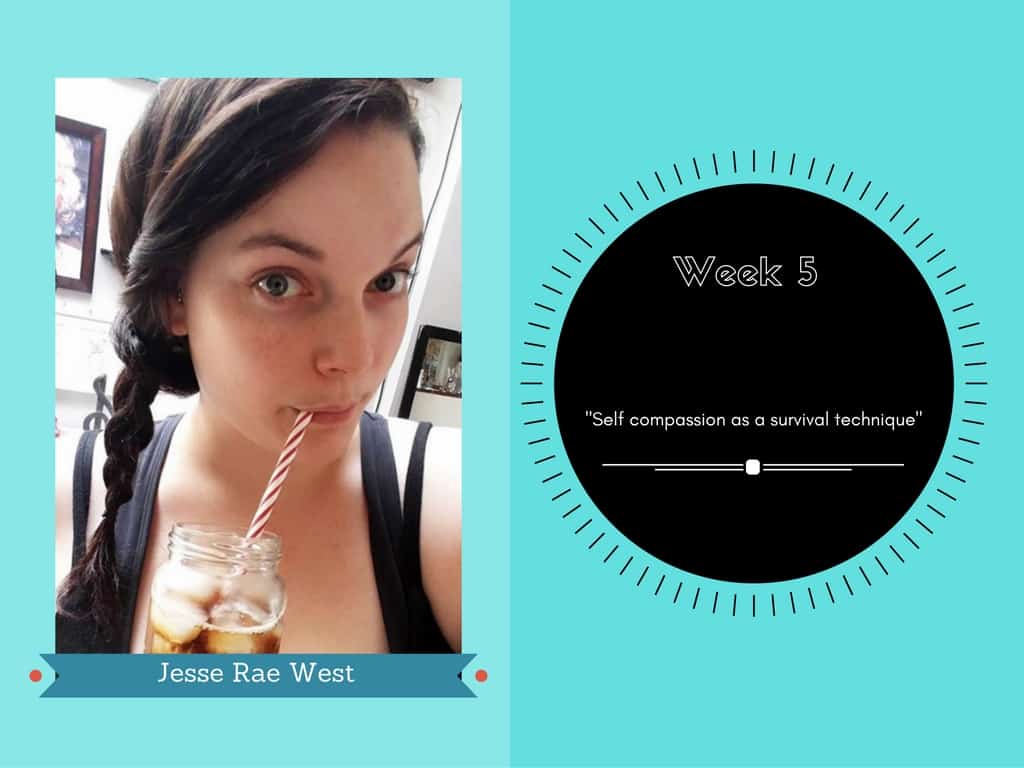Jesse Rae West takes us on her journey of healing through her Borderline Personality Disorder. Read part 1, part 2, part 3 and part 4.
Week five of therapy was a weird one. It’s the end of summer, and that has always made me feel unsettled. I don’t know if it’s because change is hard for me or because I’m reminded of the many years I spent trying to do well in school. But this summer came and went so quickly, and now I need to prepare myself for winter and all of the stress I associate with it.
I want to talk about self-care and compassion, and what that looks like when bath bombs aren’t cutting it anymore. Self-care is a survival technique; it is not about how much income you dedicate to treating yourself. (Anxiety doesn’t respond to ice cream and scented candles.)
My self-care is starting to feel more like a habit and less like a chore. I look forward to my therapy sessions and find comfort in the routine. While having two appointments a week is intense and time-consuming, it is my safety net right now. I know that no matter how hard or sad things get I can count on the stability and commitment I’ve made to this program.
This week my therapist introduced the ideas of “putting my oxygen mask on” and “keeping my gas tank full.” If you’ve been on a plane before you’ve probably received the oxygen mask demonstration in which you’re told to put your oxygen mask on before you help someone else put his or hers on. I’m unable to take care of others if I’m not practicing self-care. So keeping my gas tank full allows me the energy to show love to myself and to others, and that is my ideal state.
Everyone’s tank gets full in a different way. When you’re depressed, basic tasks can feel impossible, especially if you’re going on day five hundred million of feeling exhausted and sad. I’m not here to preach self-care like some fun task-based to-do list that will fix everything. It won’t. I can say that it will make your life easier though, especially if you start to view it more as compassion instead of care. We can all be more compassionate towards ourselves and a great way to start is by filling your gas tank.
For me, this means eating something healthy every few hours. Skipping meals is my go-to when I’m stressed, but our brains cannot function without calories, and hunger can have profoundly negative effects. Sleep is also crucial. I might not be the cool girl who can handle life on five hours sleep, but I am well rested. When I am well rested and my brain has calories, I am most prepared to utilize the other skills I have that help me feel calm and happy.
When our gas tank is full, it is easier to practice self-compassion. Dialectical Behaviour Therapy teaches self-compassion in three basic tenets:
- Self-Kindness vs. Self-Judgement. Self-kindness is recognizing that being imperfect or having failures is part of being human. We all make mistakes and experience pain. I am showing compassion for myself by rejecting the idea that I am unlovable or broken. This allows me to move on quicker and establish emotional balance.
- Common humanity vs. Isolation is the idea that suffering is universal. Rather than thinking this pain is something only I experience, I’m trying to accept that part of being alive is struggling and I am not alone in this.
- Mindfulness vs. Self-Identification is about finding balance within yourself, neither suppressing nor exaggerating your feelings. This is the ultimate exercise in observation without action. We need to feel our pain before we can show compassion for it, the way we would with a friend. This mindfulness practice is about identifying a feeling and not getting swept away in the emotions that follow. I like to picture my pain as a log floating down a river while I sit on dry land to observe. Sometimes I can see it coming, it gets really close and then it floats away. I don’t need to pick it up so I can inspect the fungus and rotted wood. I know how bad it is.
I imagine it won’t always seem so intensive, but for now I am treating myself like someone recovering from being in a coma for the past few years. I’m relearning how to take care of myself and prioritize the tasks that keep me well.



 Follow Us On Instagram
Follow Us On Instagram
